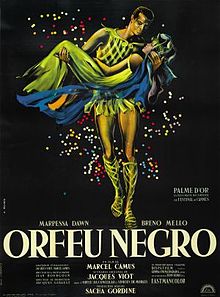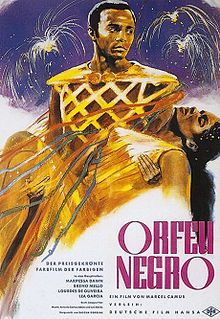- Black Orpheus
-
For other uses, see Black Orpheus (disambiguation).
Black Orpheus
(Orfeu Negro)
original movie posterDirected by Marcel Camus Produced by Sacha Gordine Written by Marcel Camus
Vinicius de Moraes
Jacques ViotStarring Breno Mello
Marpessa Dawn
Lourdes de Oliveira
Léa GarciaMusic by Luiz Bonfá
Antônio Carlos Jobim
João GilbertoCinematography Jean Bourgoin Editing by Andrée Feix Studio Dispat Films (FR)
Gemma (IT)
Tupan Filmes (BR)Distributed by GAGA Communications
Lopert PicturesRelease date(s) 12 June 1959 (France) Running time 107 minutes Country Brazil
France
ItalyLanguage Portuguese Black Orpheus (Portuguese: Orfeu Negro) is a 1959 film made in Brazil by French director Marcel Camus. It is based on the play Orfeu da Conceição by Vinicius de Moraes, which is an adaptation of the Greek legend of Orpheus and Eurydice, setting it in the modern context of a favela in Rio de Janeiro during the Carnaval. The film was an international co-production between production companies in Brazil, France and Italy.
The film is particularly renowned for its soundtrack by two Brazilian composers: Antônio Carlos Jobim, whose song "A felicidade" opens the film; and Luiz Bonfá, whose "Manhã de Carnaval" and "Samba of Orpheus" have become bossa nova classics.
Black Orpheus won the Palme d'Or at the 1959 Cannes Film Festival[1] as well as the 1960 Academy Award for Best Foreign Language Film[2] and the 1960 Golden Globe Award for Best Foreign Film (in those awards the film was credited as a French production; only in the 1961 BAFTA Award for Best Foreign Language Film was Brazil credited together with France and Italy).
Large tracts of the film were shot in the Morro da Babilônia, a favela in the Leme neighbourhood of Rio de Janeiro.[3][4] In 1999, the film was remade as Orfeu by Carlos Diegues, this time with a soundtrack featuring Brazilian singer-songwriter Caetano Veloso.
Contents
Plot
The movie opens with images of white Greek statues that explode to reveal black men dancing samba to drums in a favela. Eurydice (Marpessa Dawn) arrives in Rio de Janeiro, Brazil and takes a trolley driven by Orfeu (Breno Mello). New to the city, she rides to the end of the line. Orfeu introduces her to the station guard, Hermes (Alexandro Constantino), who gives her directions to the home of her cousin Serafina (Léa Garcia).
Although engaged to Mira (Lourdes de Oliveira), Orfeu is a playboy and not very enthusiastic about the upcoming marriage. Orfeu and Mira go to get a marriage license. When the clerk at the courthouse hears Orfeu's name, he jokingly asks if Mira is Eurydice, annoying her. Afterward, Mira insists on getting an engagement ring. Though Orfeu has just been paid, he would rather use his money to get his guitar out of the pawn shop for the carnival. Mira finally offers to loan Orfeu the money to buy her ring.
When Orfeu goes home, he is pleased to find Eurydice staying next door with Serafina. Eurydice has run away to Rio to hide from a strange man she believes wants to kill her. The man (Death dressed in a stylized skeleton costume) finds her, but Orfeu gallantly chases him away. Orfeu and Eurydice fall in love, yet are constantly on the run from both Mira and Death. When Serafina's sailor boyfriend Chico (Waldemar De Souza) shows up, Orfeu offers to let Eurydice sleep in his home, while he takes the hammock outside. Eurydice invites him to her bed.
Orfeu, Mira, and Serafina are the principal members of a samba school, one of many parading during Carnival. Serafina decides to have Eurydice dress in her costume so that she can spend more time with her sailor. A veil conceals Eurydice's face; only Orfeu is told of the deception. During the parade, Orfeu dances with Eurydice rather than Mira.
Eventually, Mira spots Serafina among the spectators and rips off Eurydice’s veil. Eurydice is forced once again to run for her life from first Mira, then Death. Trapped in Orfeu's own trolley station, she hangs from a power line to get away from Death and is killed accidentally by Orfeu when he turns the power on and electrocutes her. Death tells Orfeu "Now she's mine" before knocking him out.
Distraught, Orfeu looks for Eurydice at the office of Missing Persons, though Hermes has told him she is dead. The building is deserted at night, with only a janitor sweeping up. He tells Orfeu that the place holds only papers and that no people can be found there. Taking pity on Orfeu, the janitor takes him down a large darkened spiral staircase (a reference to the mythical Orpheus' descent into the underworld) and to a Macumba ritual, a regional form of the Afro-Brazilian religion Candomblé.
At the gate, there is a dog named Cerberus, after the three-headed dog of Hades in Greek mythology. During the ritual, the janitor tells Orfeu to call to his beloved by singing. The spirit of Eurydice inhabits the body of an old woman and speaks to him. Orfeu wants to gaze upon her, but Eurydice begs him not to lest he lose her forever. When he looks anyway, he sees the old woman, and Eurydice's spirit departs (as in the Greek myth).
Orfeu wanders in mourning. He retrieves Eurydice's body from the city morgue and carries her in his arms across town and up the hill toward his home. Orfeu's shack is burning. A vengeful Mira, running amok, flings a stone that hits him in the head and knocks him over a cliff to his death.
Two children, Benedito and Zeca, follow Orfeu around throughout the film. They believe Orfeu's story that his guitar playing causes the sun to rise in the morning. After Orfeu's death, Benedito insists that Zeca pick up the guitar and play so that the sun will rise. Zeca plays, and the sun does rise. A little girl comes by, gives Zeca a single flower and the film ends with the three of them dancing.
Cast
- Breno Mello as Orfeu
- Marpessa Dawn as Eurydice
- Marcel Camus as Ernesto
- Fausto Guerzoni as Fausto
- Lourdes de Oliveira as Mira
- Léa Garcia as Serafina
- Adhemar da Silva as Death
- Alexandro Constantino as Hermes
- Waldemar De Souza as Chico
- Jorge Dos Santos as Benedito
- Aurino Cassiano as Zeca
- Cast notes
- Marpessa Dawn was not from Brazil, but rather Pittsburgh.[5]
- Da Silva, the actor who played Death, was a triple jumper who won two Olympic gold medals, in 1952 and 1956.
- A young boy who dances across the screen playing a pandeiro grew up to win a national pandeiro-playing contest and play his instrument around the world. Currently, Carlinhos Pandeiro de Ouro teaches in Los Angeles and at California Brazil Camp.
Influence
Black Orpheus was cited by Jean-Michel Basquiat as one of his early musical influences. In President Barack Obama's bestselling memoir Dreams from My Father, he notes that it was his mother's favorite film.
See also
- List of submissions to the 32nd Academy Awards for Best Foreign Language Film
- List of French submissions for the Academy Award for Best Foreign Language Film
References
- ^ "Festival de Cannes: Black Orpheus". festival-cannes.com. http://www.festival-cannes.com/en/archives/ficheFilm/id/3471/year/1959.html. Retrieved 15 February 2009.
- ^ "The 32nd Academy Awards (1960) Nominees and Winners". oscars.org. http://www.oscars.org/awards/academyawards/legacy/ceremony/32nd-winners.html. Retrieved 2011-10-27.
- ^ Social Science Representations of Favelas in Rio De Janeiro: A Historical Perspective, Licia Valladares
- ^ Movie palace, The Guardian, January 14, 2006
- ^ Marpessa Dawn at the Internet Movie Database
External links
- Black Orpheus trailer on YouTube
- Scenes from Orfeu Negro 1959 on YouTube
- Black Orpheus at the Internet Movie Database
- Black Orpheus at the TCM Movie Database
- Black Orpheus at AllRovi
- Criterion Collection essay by David Ehrenstein
- Culture Vulture review of Black Orpheus
- Orfeu Negro new production web site
Awards Preceded by
Woman in a Dressing GownGolden Globe for Best Foreign Film
1960Succeeded by
The Virgin SpringAcademy Award for Foreign Language Film Winners (1947–1960) 1947–1955 (Honorary) 1947: Shoe-Shine • Vittorio De Sica • 1948: Monsieur Vincent • Maurice Cloche • 1949: Bicycle Thieves • Vittorio De Sica • 1950: The Walls of Malapaga • René Clément • 1951: Rashomon • Akira Kurosawa • 1952: Forbidden Games • René Clément • 1954: Gate of Hell • Teinosuke Kinugasa • 1955: Samurai, The Legend of Musashi • Hiroshi Inagaki
1956–1960 1956: La Strada • Federico Fellini • 1957: Nights of Cabiria • Federico Fellini • 1958: My Uncle • Jacques Tati • 1959: Black Orpheus • Marcel Camus • 1960: The Virgin Spring • Ingmar Bergman
Complete list · Submissions · (1947–1960) · (1961–1980) · (1981–2000) · (2001–2020) Palme d'Or winning films – 1939–1959 Union Pacific (1939) · Iris and the Lieutenant (1946) · The Lost Weekend (1946) · The Red Meadows (1946) · Brief Encounter (1946) · Maria Candelaria (1946) · Neecha Nagar (1946) · The Turning Point (1946) · La Symphonie Pastorale (1946) · The Last Chance (1946) · Men Without Wings (1946) · Rome, Open City (1946) · The Third Man (1949) · Miss Julie (1951) · Miracle in Milan (1951) · The Tragedy of Othello: The Moor of Venice (1952) · Two Cents Worth of Hope (1952) · The Wages of Fear (1953) · Gate of Hell (1954) · Marty (1955) · The Silent World (1956) · Friendly Persuasion (1957) · The Cranes Are Flying (1958) · Black Orpheus (1959)
Categories:- 1959 films
- Brazilian films
- French films
- Portuguese-language films
- BAFTA winners (films)
- Best Foreign Language Film Academy Award winners
- Bossa nova albums
- Films based on Greco-Roman mythology
- Films shot in Brazil
- Palme d'Or winners
- Romantic fantasy films
- Films set in Rio de Janeiro
Wikimedia Foundation. 2010.

